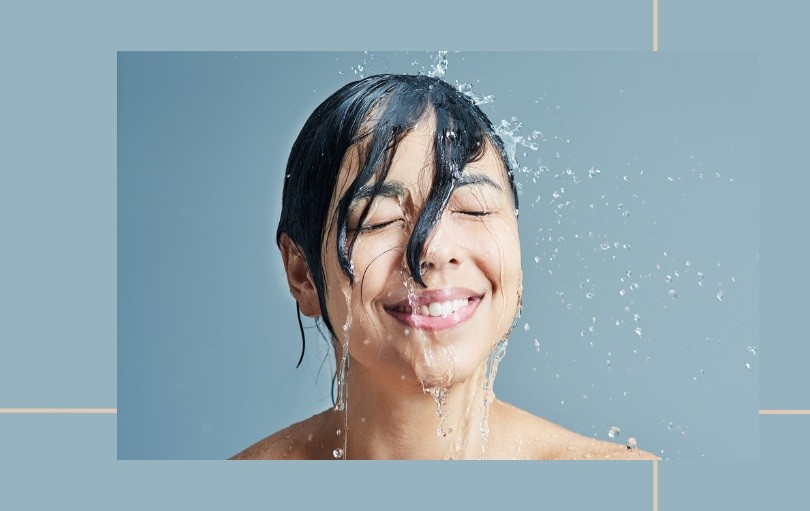Last Updated on March 28, 2025
Cold water does not help your hair grow. It is a myth that cold water can stimulate hair growth.
Research has shown that hair growth is primarily determined by genetics and hormones, not water temperature.
Know The Hair Growth Cycle
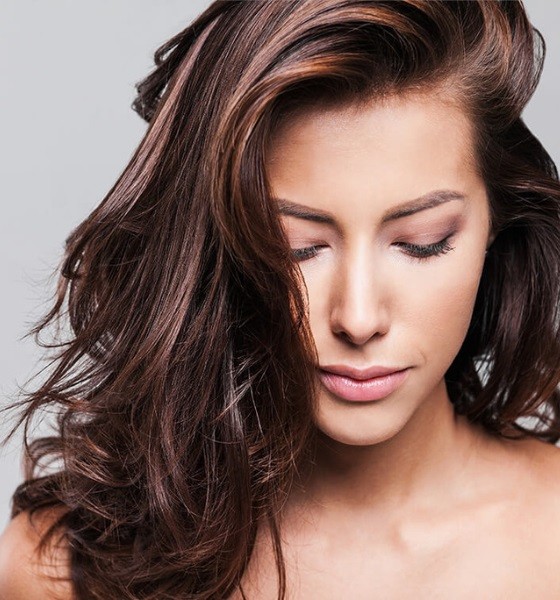
Have you ever wondered how your hair grows? Understanding the hair growth cycle is key to determining whether cold water can help stimulate hair growth. Let’s dive in and explore the three phases of the hair growth cycle: anagen, catagen, and telogen.
Anagen Phase:
- The anagen phase is the active growth phase of the hair cycle.
- During this phase, hair follicles are constantly dividing and producing new cells, which results in hair growth.
- The length of the anagen phase varies for each individual and can last anywhere from two to six years.
- Approximately 85% of the hair on your scalp is estimated to be in the anagen phase at any given time.
Catagen Phase:
- The catagen phase follows the anagen phase and is considered a transitional phase.
- This phase is relatively short and lasts only a few weeks.
- During catagen, the hair follicle shrinks, its blood supply is cut off, and hair growth stops.
- It is estimated that less than 1% of your hair is in the catagen phase at any given time.
Telogen Phase:
- The telogen phase is the final phase of the hair growth cycle.
- During this phase, the hair follicle is resting and no longer producing new hair.
- After about two to three months in the telogen phase, the old hair is shed, and new hair starts to grow from the same follicle.
- Around 10-15% of your hair is estimated to be in the telogen phase at any given time.
The hair growth cycle is essential because it helps to debunk common misconceptions about hair growth. While cold water may improve the appearance and health of your hair, it does not directly affect the hair growth cycle. The hair growth cycle is primarily influenced by genetics, hormones, age, and overall health.
Now that we have a better understanding of the hair growth cycle, let’s explore whether cold water can have any benefits for your hair in next section.
Factors Influencing Hair Growth
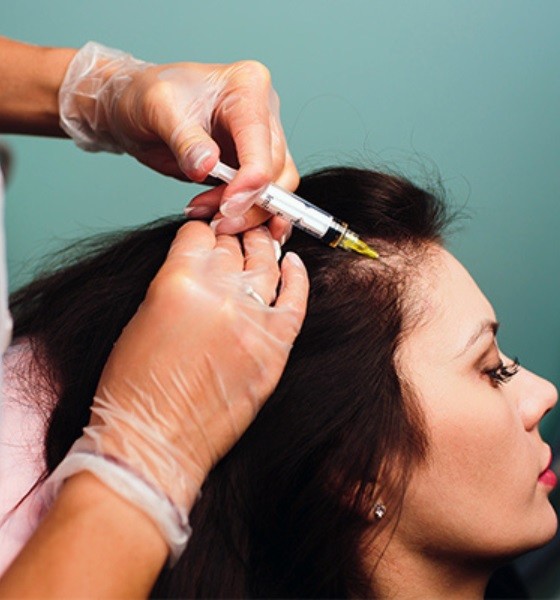
Having strong and healthy hair is a goal for many individuals, but there are several factors that can influence hair growth. From diet and nutrition to hormonal balance, genetics, and stress levels, understanding these elements can help you take better care of your locks.
Let’s delve into each factor to gain a better understanding:
Diet And Nutrition:
The food we consume plays a crucial role in overall health, including hair growth. Proper nutrition provides the necessary vitamins and minerals to nourish our hair follicles. Here are some diet and nutrition factors to consider:
- Protein intake: Amino acids found in proteins are the building blocks of hair. Including sources like lean meats, fish, beans, and nuts can contribute to stronger and healthier hair.
- Vitamin A: This vitamin helps produce sebum, an oily substance that moisturizes the scalp. Include carrots, sweet potatoes, and spinach in your diet.
- Biotin: Also known as vitamin H, biotin promotes healthy hair growth. Eggs, avocados, and nuts are rich sources of biotin.
Hormonal Balance:
Hormones play a significant role in hair growth, and any imbalances can negatively affect its health. Consider the following hormonal factors:
- Estrogen and progesterone: These hormones contribute to hair growth while maintaining its texture and strength. Hormonal changes during pregnancy, menopause, or certain medical conditions can impact hair growth.
- Testosterone: An excess of this hormone can lead to hair loss in both men and women.
Genetics:
Genetics have a significant impact on the characteristics of our hair, including its growth patterns and thickness. Understanding your family history may provide some insights into your hair growth potential. Keep in mind:
- Hair growth cycles: Different individuals have varying hair growth cycles, which can be influenced by genetics. Some people naturally have faster or slower hair growth rates.
Stress Levels:
Surprisingly, stress can affect not only our mental well-being but also our hair growth. When stress levels are high, the hair growth cycle can be disrupted, leading to hair loss. Consider the following points:
- Telogen effluvium: This condition, triggered by stress, sends a significant number of hair follicles into a resting phase, causing them to fall out.
- Alopecia areata: This autoimmune disease is linked to increased stress levels and may result in hair loss.
By taking these factors into account, you can make more informed choices to support your hair growth journey. Remember to focus on a nutrient-rich diet, maintain a healthy hormonal balance, understand your genetic predispositions, and manage your stress levels effectively.
The Effect Of Cold Water On Hair Follicles
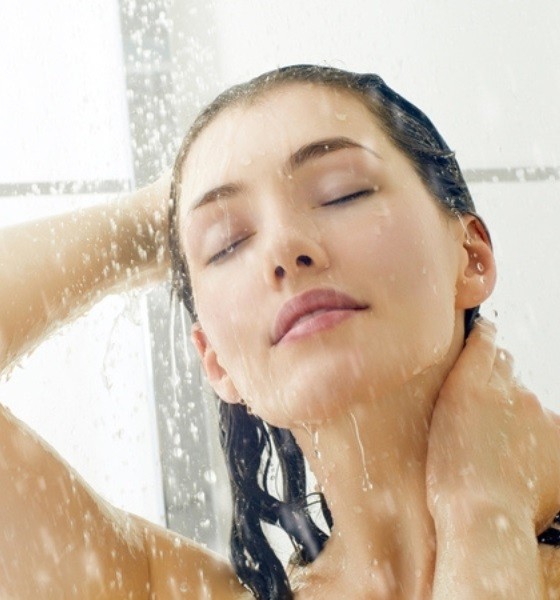
While there is no definitive scientific evidence that cold water directly promotes hair growth, it is believed to have several positive effects on hair follicles. Let’s take a closer look at how cold water affects blood circulation to the scalp, as well as its impact on hair follicles and nutrient absorption.
How Cold Water Affects Blood Circulation To The Scalp:
- Cold water causes blood vessels in the scalp to constrict, leading to a temporary reduction in blood flow.
- This constriction of blood vessels can help stimulate blood circulation to the scalp when warm water is used afterward.
- Increased blood circulation can potentially provide more oxygen and nutrients to the hair follicles, promoting healthier hair growth.
Impact On Hair Follicles And Nutrient Absorption:
- Cold water can help seal the hair cuticles, preventing moisture loss and reducing frizz.
- Sealed cuticles also make the hair appear smoother and shinier.
- Cold water rinses can enhance the absorption of nutrients from hair care products, ensuring they penetrate the hair shaft effectively.
- Proper nutrient absorption can contribute to stronger and healthier hair.
While using cold water on your hair may not be a miraculous solution for hair growth, it can have positive impacts on blood circulation to the scalp and hair follicles. Consider incorporating cold water rinses into your hair care routine for potential benefits like improved nutrient absorption and enhanced hair health.
Cold Water Vs. Hot Water
The Benefits And Drawbacks Of Using Hot Water On Hair:
- Hot water opens up the hair cuticles, allowing for better penetration of hair products.
- Hot water helps to remove excess oil, dirt, and product buildup from the scalp.
- However, hot water can strip the natural oils from the hair, leading to dryness and increased frizz.
- It can also cause damage to the hair strands, making them more prone to breakage and split ends.
Why Cold Water May Be More Beneficial For Hair Growth:
- The cold water helps to seal the hair cuticles, locking in moisture and making the hair shaft smoother.
- This can result in shinier and healthier-looking hair.
- Cold water also stimulates blood circulation in the scalp, promoting hair growth.
- Moreover, cold water helps to protect the natural oils in the hair, preventing dryness and damage.
Remember, hair growth is influenced by various factors, including genetics, overall health, and hair care routine. While cold water may have some benefits for hair growth, it’s essential to maintain a well-rounded approach to hair health by using suitable hair products, eating a balanced diet, avoiding heat styling, and regularly trimming the ends.
Sealing The Hair Cuticles
How Cold Water Helps In Smoothing The Hair Cuticles:
When it comes to hair care, we often seek out various methods to enhance the health and appearance of our locks. One technique that has gained popularity is rinsing the hair with cold water. But does cold water really help your hair grow?
Let’s explore the topic further by examining the effect of cold water on sealing hair cuticles, enhancing hair shine, and reducing frizz.
Sealing The Hair Cuticles:
- Cold water aids in closing the hair cuticles, which are tiny scales that cover the hair shaft. When the cuticles are sealed, the hair retains moisture, looks smoother, and feels softer.
- The low temperature of cold water helps to constrict the cuticles, preventing them from standing up and causing the hair to become frizzy or tangled.
- By sealing the cuticles, cold water helps to protect the inner layers of the hair, making it less prone to damage from heat styling, pollution, and environmental factors.
Enhancing Hair Shine:
- Cold water can provide a natural shine to your hair by reflecting more light off the smooth cuticle layer.
- Sealing the cuticles with cold water helps the hair to lay flat, reducing the uneven surfaces that can cause light to scatter and make the hair appear dull.
- Furthermore, cold water helps to trap natural oils and moisturizing products in the hair, leaving it looking healthy and lustrous.
Reducing Frizz:
- One of the major benefits of rinsing your hair with cold water is its ability to reduce frizz. When the cuticles are closed and lying flat, the hair becomes more resistant to humidity and external elements that can cause frizz.
- The cold water helps to balance the hair’s moisture levels, minimizing the chance of dryness, which can contribute to frizz.
- By reducing frizz, cold water can also improve the overall manageability of your hair, allowing for easier styling and a sleeker appearance.
Cold water can indeed contribute to the health and growth of your hair. By sealing the hair cuticles, enhancing shine, and reducing frizz, this simple hair care technique can leave your locks looking smooth, vibrant, and nourished. So, why not embrace the refreshing benefits of cold water and give your hair the care it deserves?
Increasing Hair Strength And Elasticity
The Impact Of Cold Water On Hair Flexibility And Resistance:
Cold water can have a positive impact on the flexibility and resistance of your hair, leading to stronger and healthier strands. Here’s how:
- Contraction of hair cuticles: Cold water causes the hair cuticles to contract, which helps to seal in moisture and nutrients. This contraction creates a protective layer around the hair shaft, making it less prone to damage and breakage.
- Increased blood circulation: When you expose your scalp to cold water, it stimulates blood circulation, delivering essential nutrients and oxygen to the hair follicles. This enhanced blood flow can promote hair growth and improve the overall health of your hair.
- Improved moisture retention: Hot water can strip away the natural oils from your hair, leaving it dry and brittle. Cold water, on the other hand, helps to seal the moisture within the hair shaft, preventing moisture loss and maintaining hydration levels. This keeps your hair more elastic and less susceptible to damage.
- Enhanced shine and smoothness: Cold water helps to flatten the hair cuticles, resulting in smoother and shinier hair. With the cuticles lying flat, light can reflect off the hair more evenly, giving it a healthy and lustrous appearance.
Prevention Of Hair Breakage And Damage:
In addition to increasing hair strength and elasticity, cold water can also play a significant role in preventing hair breakage and damage. Here’s why:
- Minimizes heat damage: Excessive heat from styling tools can weaken the hair and cause breakage. By rinsing your hair with cold water after styling, you can help to close the hair cuticles and reduce the heat damage caused by styling tools, such as flat irons or curling wands.
- Reduced frizz: Cold water helps to seal the hair cuticles, preventing moisture from entering and leaving the hair shaft. This, in turn, reduces frizz and makes your hair more manageable and smooth.
- Decreased hair porosity: Cold water can lower the porosity of your hair, meaning it is less likely to absorb excess moisture from the environment. This helps to maintain a balance of moisture in your hair and prevents damage caused by swelling and contraction of the hair shaft.
- Protection against environmental factors: Cold water rinses can provide a protective barrier on your hair against environmental factors such as pollution, uv rays, and harsh weather conditions. This additional layer of protection can help to minimize damage and keep your hair healthy and strong.
Remember, while cold water can offer numerous benefits to your hair, it is important to balance it with warm water for comfortable cleansing. Incorporating cold water into your hair care routine can be a refreshing and effective way to boost hair strength, enhance elasticity, and reduce breakage and damage.
Cold Water Rinses
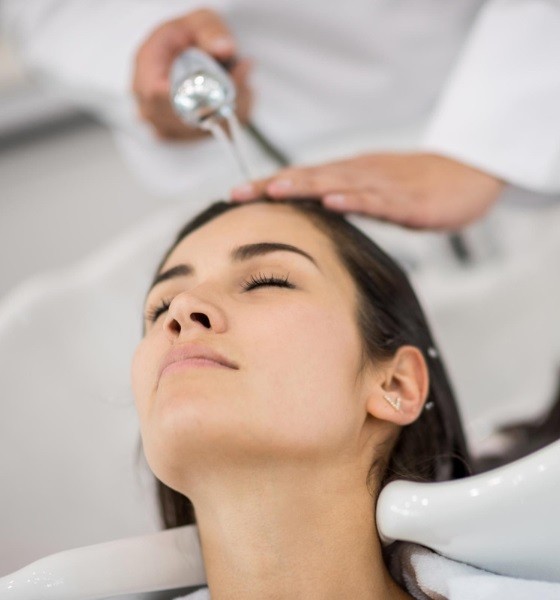
Are you looking for a simple and inexpensive way to promote hair growth? Cold water rinses may just be the answer you’ve been searching for. Incorporating cold water rinses into your haircare routine can provide numerous benefits for your hair.
We will explore how to incorporate cold water rinses into your routine, as well as the recommended frequency and duration for optimal results.
How To Incorporate Cold Water Rinses Into Your Haircare Routine:
- Begin by shampooing and conditioning your hair as usual.
- Once you have rinsed out the conditioner, gradually lower the water temperature to cold.
- Allow the cold water to flow through your hair, focusing on the scalp and lengths.
- Massage your scalp for a few minutes to enhance blood circulation.
- Finish by rinsing your hair with cold water for around 30 seconds to a minute.
The Recommended Frequency And Duration:
- Incorporating cold water rinses into your haircare routine can be done 2-3 times a week.
- Keep the duration of cold water rinses to a maximum of 1-2 minutes.
- Remember that each individual may have varying hair types and preferences, so adjust the frequency and duration to suit your specific needs.
Alternating Temperatures
The Benefits Of Alternating Between Cold And Warm Water During Showers
When it comes to hair care, the temperature of the water you use can have a significant impact on the health and growth of your hair. While warm water is commonly used for washing hair, did you know that alternating between cold and warm water during showers can provide numerous benefits?
Here are some reasons why incorporating this technique into your hair care routine can lead to optimal results:
- Stimulates blood circulation: Cold water causes the blood vessels in the scalp to constrict, which helps increase blood flow to the hair follicles. On the other hand, warm water promotes relaxation and opens up the blood vessels. Alternating between the two temperatures can effectively stimulate blood circulation in the scalp, promoting healthy hair growth.
- Seals hair cuticles: Cold water has the ability to seal the hair cuticles, making them lie flat and appear shinier. This protective barrier helps prevent moisture loss, making the hair less prone to damage and breakage. Warm water, on the other hand, helps to cleanse the scalp and remove any build-up of dirt and oil. Alternating between the two temperatures provides a balance of benefits for your hair.
- Enhances scalp health: Cold water can help soothe an irritated scalp and reduce inflammation. It can also help control excess oil production, keeping the scalp clean and balanced. On the other hand, warm water can help relax tense scalp muscles and promote a sense of calm. By alternating between cold and warm water, you can maintain a healthy scalp environment for optimal hair growth.
How To Implement This Technique For Optimal Results
Implementing the technique of alternating between cold and warm water during showers is simple and can be easily incorporated into your hair care routine. Here’s how to do it for the best results:
- Start with warm water: Begin your shower with warm water to cleanse and remove any impurities from your hair and scalp. This will help open up the hair cuticles and allow for deep cleansing.
- Rinse with cold water: After washing your hair with warm water, finish your shower by rinsing your hair with cold water. This will help seal the hair cuticles, lock in moisture, and provide a shinier appearance.
- Gradually adjust the temperature: If you find it challenging to tolerate cold water initially, start by slowly incorporating it into your routine. Gradually decrease the temperature of the water over time until you can comfortably rinse your hair with cold water.
- Be consistent: Consistency is key when it comes to any hair care routine. Aim to alternate between cold and warm water during every hair wash for optimal results.
By implementing this technique and following these steps, you can maximize the benefits of alternating temperatures and promote healthy hair growth.
Cold Water Post-Shampooing
Cold water rinses after shampooing can provide numerous benefits for your hair. Here’s how incorporating cold water post-shampooing can help enhance the effectiveness of hair products:
- Reduced frizz: The cold water temperature helps seal the hair cuticles, preventing moisture loss and reducing frizz. This can leave your hair looking smoother and more manageable.
- Increased shine: Cold water rinses can impart a natural shine to your hair by smoothing the cuticles and reflecting light. This can give your hair a healthy, glossy appearance.
- Improved product absorption: Cold water helps to close the pores on your scalp and hair follicles, promoting better absorption of the hair products you use after shampooing. This allows the active ingredients to penetrate the hair shaft more effectively, providing greater benefits.
- Enhanced moisture retention: Cold water rinses can help lock in moisture, leading to better hydration of your hair. This is beneficial for maintaining the health and elasticity of your strands, reducing breakage and split ends.
- Stimulated blood circulation: The cold water temperature stimulates blood flow to the scalp, which can promote healthier hair growth. Improved circulation ensures that the hair follicles receive an adequate supply of nutrients and oxygen, supporting their overall health.
- Refreshing and invigorating: There’s nothing quite like cold water rinse to awaken your senses and provide a refreshing sensation after shampooing. It can leave your hair feeling re-energized and your scalp invigorated.
With these benefits in mind, incorporating cold water rinses into your post-shampoo routine can be a simple yet effective step toward promoting healthier and more vibrant hair.
Frequently Asked Questions
Does Rinsing Your Hair With Cold Water Make It Grow Faster?
Rinsing your hair with cold water can improve blood circulation to the scalp, promoting hair growth.
Can Cold Water Help Prevent Hair Loss?
Cold water can help strengthen the roots, minimize damage, and prevent hair loss to some extent.
Does Cold Water Create A Shinier Appearance For Your Hair?
Cold water can help seal the hair cuticles, leaving your hair shinier and smoother in appearance.
Is It Advisable To Use Cold Water During Hair Wash?
Using cold water during hair wash helps to retain moisture, prevent frizz, and make hair more manageable.
Will Rinsing With Cold Water Make Your Hair Healthier?
Rinsing your hair with cold water can help maintain the natural oils, hydration, and overall health of your hair.
Conclusion
Based on the available research and expert opinions, it is safe to say that while cold water may not directly stimulate hair growth, it does offer several benefits for your hair health. The cold water helps to seal the hair cuticle, reducing frizz and increasing shine.
It also helps to prevent damage by keeping the hair shaft strong and preventing moisture loss. Additionally, cold water can improve circulation to the scalp, promoting a healthier environment for hair growth. While these effects may not directly make your hair grow faster, they can contribute to overall hair health and appearance.
It is important to note that individual results may vary and that other factors such as diet, genetics, and hair care routines also play a significant role in hair growth. So, while cold water alone may not be a magic solution, incorporating it into your hair care routine can definitely be beneficial for your hair.

